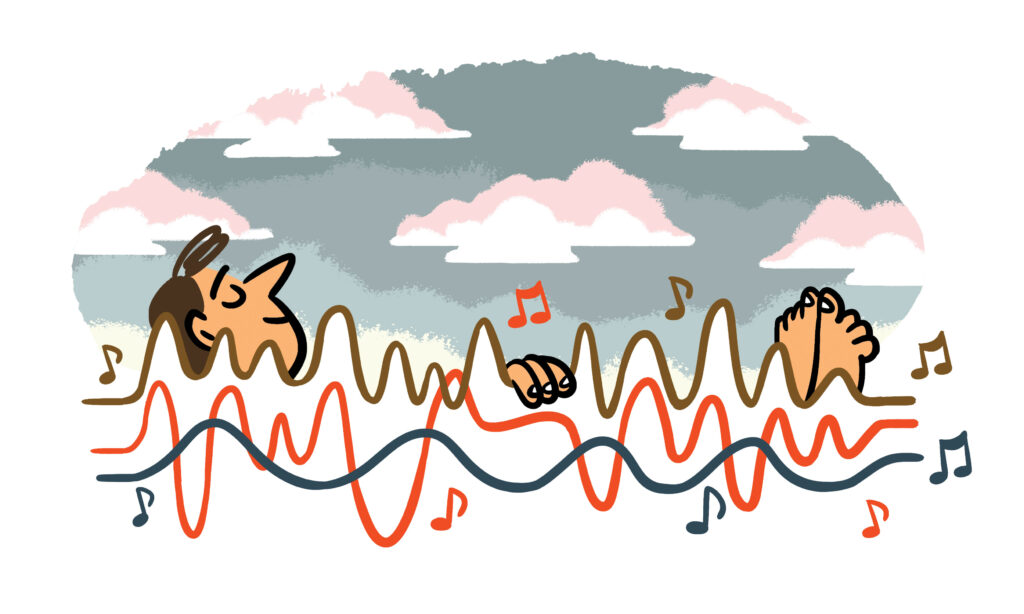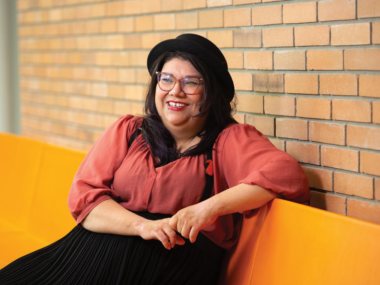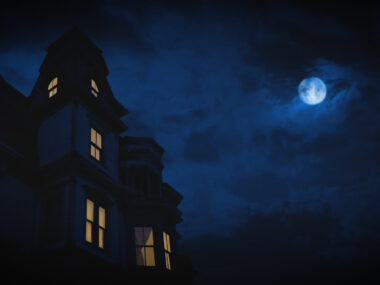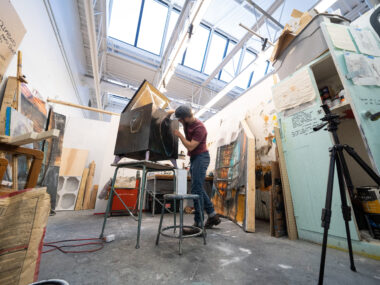
Written by Kris Demeanor, BA’92
“Don’t tell me to relax!” This was my mother, Agneta’s, protest years ago whenever the glib suggestion to “relax” would come out of my mouth at her displays of heightened emotion. My partner, Deborah, has the identical objection today. I apologize to them both.
Yes, some people wear their anxieties like Christmas lights. They are easy targets for those of us who cultivate a more mellow attitude. But then casual-me will get his coat pocket stuck on a door handle, use every foul word in existence in one sentence, and proceed to drink a bottle of wine in half an hour. I just do it in the basement away from scrutinizing eyes.
We’re all stressed. We all need to relax. But how?
Both my artistic and personal life seem to be asking that question at present. Whether we are working too much, too little, having our spare time hijacked by screens, worrying for our wounded planet, mourning our dead, caring for an infant, or delaying a celebration for the fourth time because of COVID, our mind is rarely given a break.
Not that we don’t try to give it one. Alcohol and medication are shortcuts to temporary relief. There’s the spa. There are the exhaust-your-body-and-hopefully-your-mind-will-follow activities such as Crossfit and triathlon. There are the undeniably healthy remedies of a walk in nature, time with friends who are easy on the nerves, and chamomile tea.
But how does one escape, for instance, the psychic pressures of chronic pain? My father, Wilfried Wenzel, BEd’64, has peripheral neuropathy — the pain is constant and debilitating and, as night approaches, stress increases with the knowledge that sleep will not come easily. Treatments and trusted routines are doing their part, but there is no silver-bullet cure here — it’s a collage of forces that work on bringing down the pain notch by notch.
With this in mind, my new recording of original music is called Songs for My Father to Fall Asleep To, a collection of intimate, mid-tempo compositions using only solo voice and guitar, with the singular intention of lulling my dad into a relaxed state. The songs do not contain positive platitudes, though they evoke our personal history and enjoyable adventures together. They are real reflections of both the dark and light in life — they are stories, meditations, love songs. I hope they will be distraction and solace, a sonic Percocet.
I’ll be creating a project similar in thrust this summer with Ghost River Theatre. The Great Alberta Sound Bath Experience will be a public musical experiment where waves of sound wash over prostrate participants as they are gently guided toward a sense of calm. Traditionally, a sound bath is associated with singing bowls, gongs, chimes and choral voice. Instead, we’re giving the concept a twist by composing original music using a blend of instrumental and electronic melodies, poetry, and group vocalization to take audience participants on a dynamic sound journey.
My hope is that the Sound Bath will encourage not only relaxation, but active reflection and the processing of those myriad wound-up coils in our bodies and minds. The idea is to feel renewed so that one feels more prepared for action in the “real” world.
It’s not about restoring our energy and focus so we can jump back on the same hamster’s wheel. Ideally, it will encourage a reassessment of how we live. A hopeful result, I know, but art has never needed to be more about transformation than now.
Of course, as my work turns serendipitously toward healing others, the mantra, “Doctor, heal thyself,” gets louder. Deborah and I have an eight-month-old daughter, Aviva. The topics of sleep and relaxation are a constant: “Is she over-tired or under-tired?” “Maybe, if we read her the same book over and over, we can bore her to sleep.” “Can you take her for 20 minutes so I can stare at the wall and contemplate this intractable new existence?”
I pause here to recognize that hearing about someone’s child is like hearing them talk about their dreams — eternally fascinating to the person living it and beyond tedious for the listener. So I’ll talk about both at once to get it over with. Every dream Deborah and I have now, no matter how innocuous or initially pleasant — dinner with friends, flying over a mythical city — ends in a terrified, “Where’s the baby?”
We are searching for calm in this fresh reality — dance parties and gratitude, and food is always a joy.
Is the quest for relaxation a privilege only a few in the world can entertain, while others are consumed with the business of survival or, as in Ukraine, fleeing for their lives?
Perspective is the first word in any discussion about inner peace. True contentment is unachievable if others needlessly suffer. While we in Calgary struggle to live our best lives amidst an embarrassment of comfort, wealth and security (for now), I open an email from a friend in Latvia who is convinced, with good reason, that “they are next.”
“Please enjoy a peaceful life as much as you can and have many nice times together,” he writes.
So yes, take it easy on yourself. Search for respites from stress and anxiety. I’ll try to do the same. And I won’t tell you to relax. But, if you can, while you can, please enjoy.



